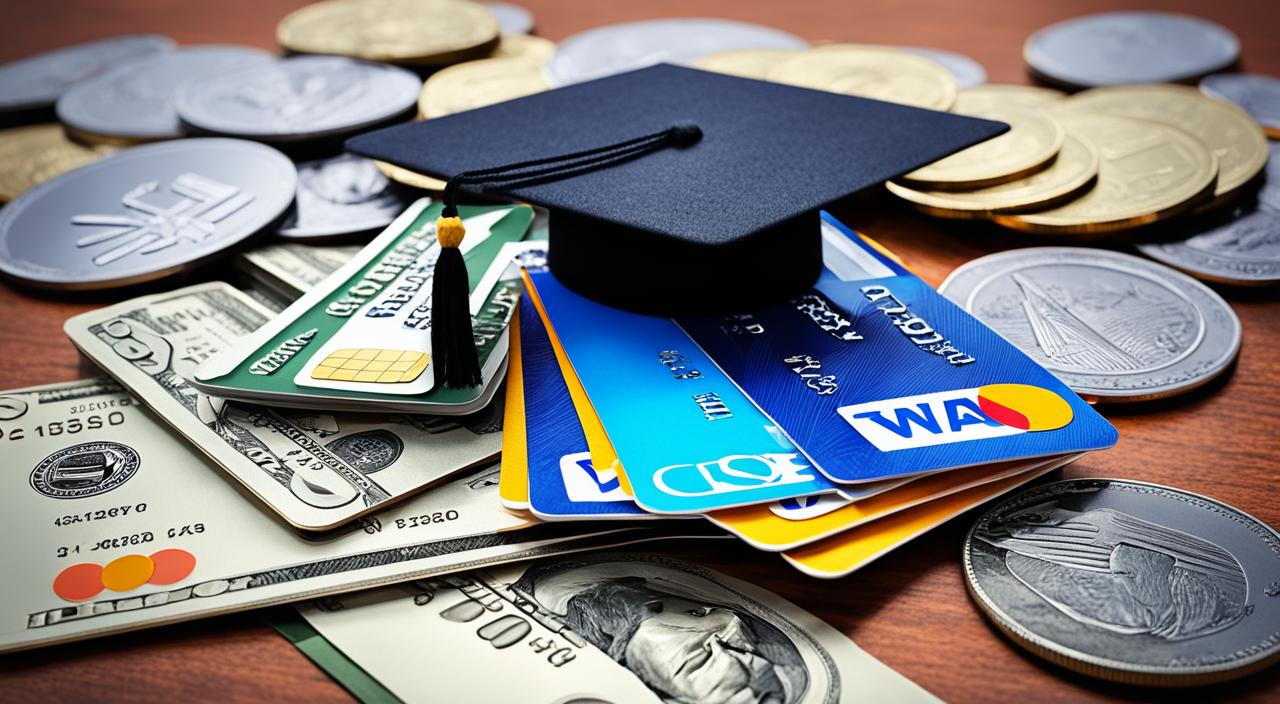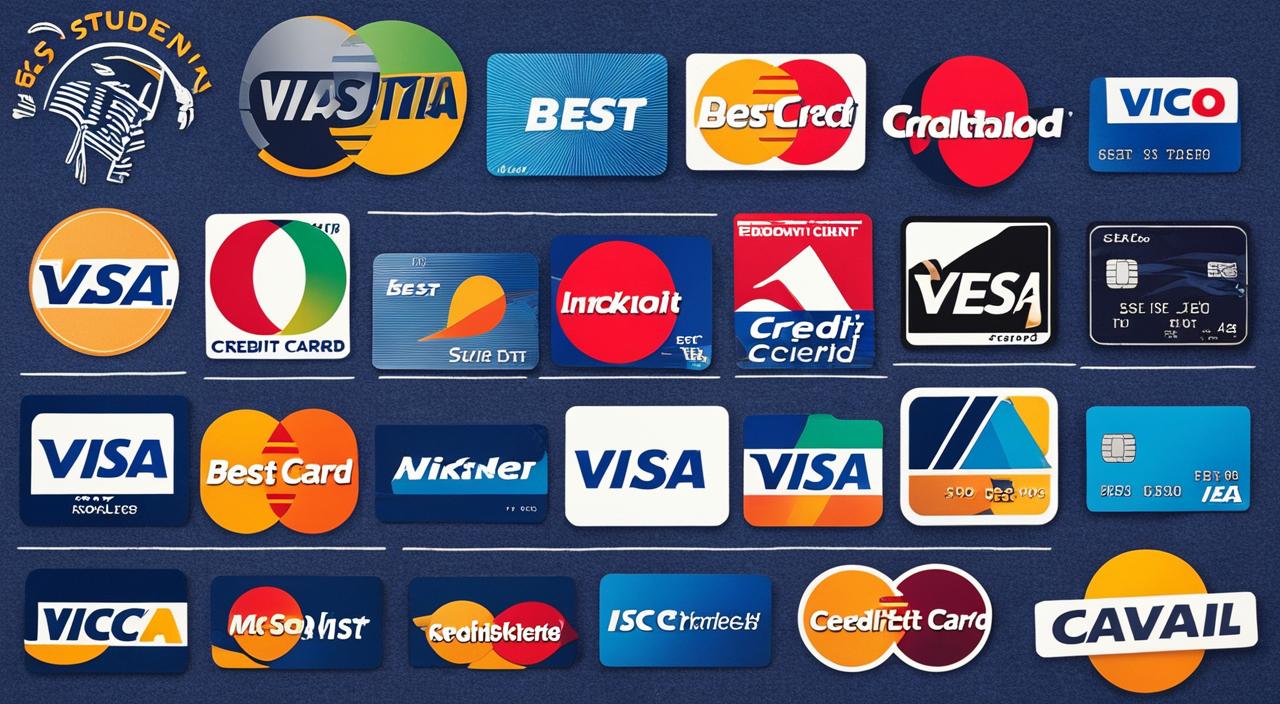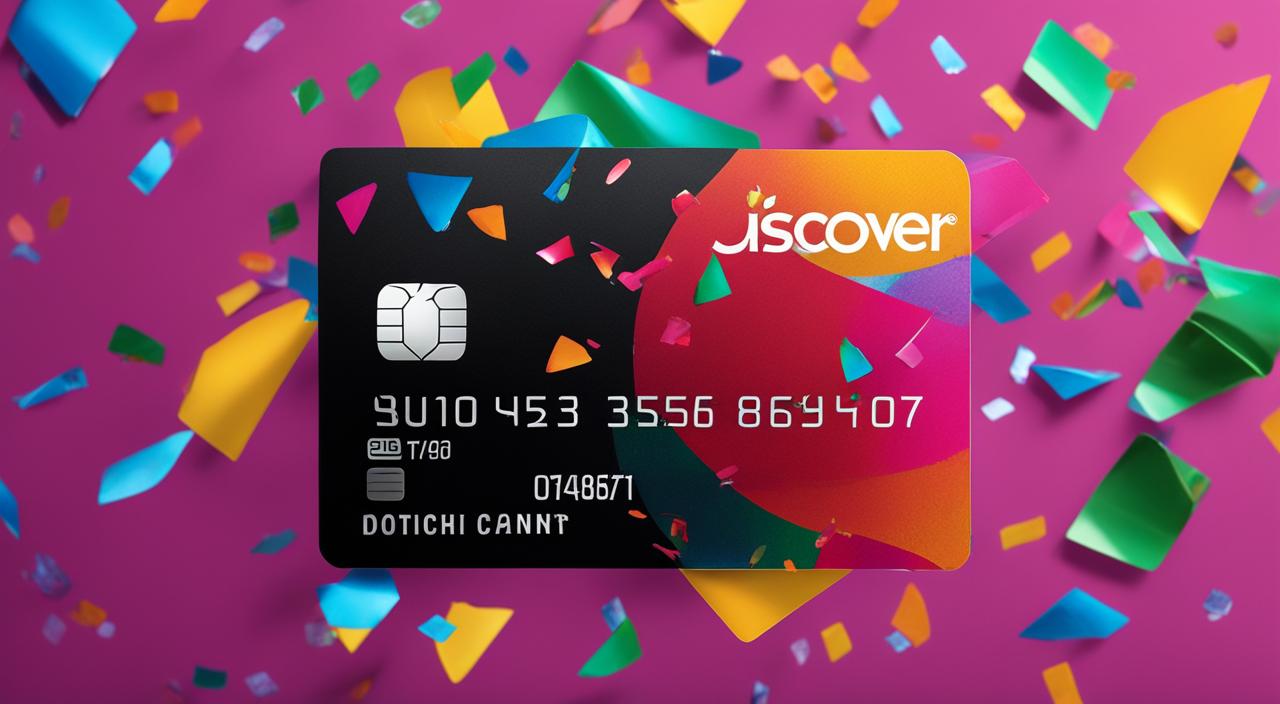As a college student, having a credit card can be a convenient and useful tool. However, with so many options available, it can be overwhelming to choose the right one. Selecting the best student credit card is essential to avoid falling into financial traps.
When searching for credit cards for students, you should consider several factors such as interest rates, fees, credit limits, rewards programs, and benefits. Evaluating different options will help you make an informed decision.
Key Takeaways:
- Choosing the right student credit card is crucial for building a solid financial foundation.
- Factors to consider when selecting a student credit card include interest rates, credit limits, rewards programs, and fees.
- Understanding the various benefits of student credit cards can be helpful in making informed decisions.
- Using your student credit card responsibly can positively impact your credit score and help build credit history.
- Managing credit card debt requires creating a repayment plan and reducing interest charges.
Understanding Student Credit Cards
Student credit cards are designed to cater specifically to the needs of college students. These cards offer numerous benefits that can help students effectively manage their finances. By understanding the available options, students can identify the card that best suits their needs.
Student Credit Card Options
One of the primary advantages of student credit cards is the array of options available. These cards come with features such as low or no annual fees, lower interest rates, and rewards programs. Many student credit cards also offer cashback rewards or incentives for responsible card usage.
To get the most out of a student credit card, it’s vital to consider the features and benefits that will benefit you the most. By analyzing your needs, like low-interest rates or a rewards program, you can select the best card for your financial situation.
read also
- Bank of America Credit Card: Benefits Guide
- American Express Credit Card: Exclusive Benefits
- Best Credit Cards 2024: Top Offers & Rewards
- Top Picks for the Best Travel Credit Card 2024
Student Credit Card Benefits
Aside from financial features, student credit cards come with additional benefits such as fraud protection, credit monitoring, and access to a free credit score. These benefits can be particularly helpful for students, adding an extra layer of security when it comes to finances and credit score management.
“By understanding the available student credit card options and their benefits, students can confidently identify the card that aligns with their financial goals.”
Factors to Consider When Choosing a Student Credit Card
When it comes to choosing a student credit card, there are several factors you should take into consideration to make an informed decision that aligns with your financial goals. Let’s explore these factors below:
Interest Rates and Fees
The interest rate of a student credit card is a crucial factor to consider, as it determines how much you will pay in interest charges on your outstanding balance. Look for a card with a reasonable APR, especially if you plan on carrying a balance from month to month. Additionally, pay attention to the card’s fees, such as annual fees, late payment fees, and balance transfer fees. Avoid cards with high fees, as they can quickly add up and increase your debt.
Credit Limit
Your credit limit refers to the maximum amount of money you can borrow on your student credit card. Choose a card with a credit limit that suits your needs and spending habits. Consider starting with a lower credit limit to avoid overspending and accumulating debt.
Rewards Programs
Many student credit cards offer rewards programs that allow you to earn cashback, points, or miles for your purchases. Look for a card with a rewards program that aligns with your spending habits and offers benefits that you will actually use. However, keep in mind that rewards programs should not be the only factor you consider when selecting a credit card.
By taking these factors into consideration, you can select a student credit card that aligns with your financial goals and helps you build a positive credit history.
Best Student Credit Card Options
Choosing the best student credit card can be overwhelming, with so many options available in the market. To help you make an informed decision, we have compiled a list of the best student credit cards that offer great rewards and benefits.
| Credit Card | Rewards Program | Fees & Interest Rates |
|---|---|---|
| Citi Rewards+ Student Card | 2x points on supermarkets and gas stations 1x points on all other purchases Bonus points on first $6,000 spent |
No Annual Fee 17.49% – 25.49% Variable APR |
| Journey® Student Rewards from Capital One® | 1% cash back on all purchases 1.25% cash back when you pay on time |
No Annual Fee 26.99% Variable APR (on purchases and balance transfers) |
| Discover it® Student Cash Back | 5% cash back on rotating categories 1% cash back on all other purchases Cash back match at end of first year |
No Annual Fee 12.99% – 21.99% Variable APR |
| Bank of America® Cash Rewards Credit Card for Students | 3% cash back on your choice of category 2% cash back at grocery stores and wholesale clubs 1% cash back on all other purchases |
No Annual Fee 14.99% – 24.99% Variable APR |
These credit cards are among the best student credit card options available today. Pay close attention to the rewards programs, fees, and interest rates before making your decision. Remember, the best student credit card for you will depend on your individual needs and financial situation.
Building Credit with a Student Credit Card
As a college student, using credit cards for college students can be an effective way to build your credit history. Consistently making on-time payments and maintaining a low utilization rate can help establish a favorable credit score. However, it is important to use your student credit card responsibly to avoid accumulating excessive debt.
To help you get started on the right foot, we’ve compiled a list of tips for responsible credit card usage with student credit card rewards:
Make On-Time Payments
Payment history is the most crucial factor in calculating your credit score, so it is essential to pay your bills on time. Missing even one payment can have a negative impact on your credit history and reduce your score. To ensure timely payments, set up automatic payments or regular reminders to pay your bills.
Maintain a Low Credit Utilization Rate
Another critical factor in building and maintaining a good credit score is your credit utilization rate, or how much of your available credit you use each month. To avoid high utilization rates, try to keep your balance below 30% of your credit limit. Maintaining a low utilization rate demonstrates responsible credit card usage and can positively impact your credit score.
Choose Rewards Programs Wisely
Student credit cards often offer rewards programs as an incentive to use the card. Be sure to choose a rewards program that aligns with your spending habits. For example, if you spend a lot on groceries and gas, choose a card that offers cashback or rewards for those purchases. However, avoid overspending in an attempt to earn rewards, as this can lead to credit card debt.
Regularly Check Your Credit Reports
Checking your credit report regularly can help you identify any errors or fraudulent activity and ensure that your credit score reflects your responsible credit usage. You can get one free credit report per year from each of the three major credit bureaus. Checking your credit score and reports regularly can alert you to potential issues and help you take corrective action to maintain your financial health.
By following these tips for building credit with a student credit card, you can establish a positive credit history and use your credit card wisely.
Tips for Responsible Credit Card Usage
Using your student credit card responsibly is essential for building good financial habits and avoiding unnecessary debt. Here are some tips to help you manage your credit card effectively:
Create a budget:
Start by creating a monthly budget that includes all of your expenses such as rent, utilities, food, and entertainment. This will help you track your spending and stay within your means.
Pay your bills on time:
Make sure you pay your credit card bills on time every month to avoid late fees and negative marks on your credit history. Set up automatic payments or reminders to help you stay on top of your payments.
Avoid unnecessary debt:
Don’t use your credit card to make purchases you can’t afford to pay back. Only use your card for necessary expenses and avoid impulse purchases.
Monitor your credit card usage:
Regularly check your credit card statements to make sure there are no fraudulent charges. If you notice anything suspicious, report it to your credit card issuer immediately.
“Using your credit card responsibly is essential for building good financial habits and avoiding unnecessary debt.”
Remember, responsible credit card usage can help you establish a positive credit history, which can benefit you in the future. By following these tips, you can use your student credit card effectively and avoid any potential financial pitfalls.
Managing and Paying off Student Credit Card Debt
Student credit cards can be a valuable tool to help build credit history, but it’s important to manage and pay off your credit card debt responsibly. Here are some practical strategies to help you stay in control of your finances:
- Create a Repayment Plan: Develop a repayment plan that works for your budget. Consider paying off higher interest debts first to reduce overall interest charges.
- Pay More Than the Minimum: Try to pay more than the minimum payment amount each month to reduce the overall interest charges and pay off the debt faster.
- Monitor Your Spending: Keep track of your credit card spending to avoid overspending and accumulating unnecessary debt.
- Avoid Making Late Payments: Late payments can result in fees and damage your credit score, so be sure to make payments on time each month.
- Consider a Balance Transfer: Look for student credit cards that offer balance transfer options to transfer high-interest debt to a card with a lower interest rate.
By following these strategies, you can take control of your credit card debt and avoid long-term financial problems. However, in some cases, seeking professional financial advice might be the best option. Consider reaching out to a financial advisor if you need additional support.

Conclusion
Choosing the right student credit card may seem overwhelming, but with the right information, it can be a simple process. Remember to research different options thoroughly and consider the factors that matter most to you.
When using your credit card, always prioritize responsible usage by adhering to your budget and paying your bills on time to build a positive credit history. Additionally, take advantage of the rewards and incentives offered by your student credit card to make the most of your spending.
Managing credit card debt can be challenging, but with the right strategies, it is possible to pay off your debt and maintain healthy finances. Create a repayment plan, reduce interest charges, and seek professional advice if necessary.
By applying the tips and advice provided in this article, you can make informed decisions about student credit cards and build a solid financial foundation for your future. Remember to prioritize financial responsibility and take control of your finances.
FAQ
Why is it important to choose the right credit card for college students?
Choosing the right credit card for college students is important because it can help you establish a positive credit history and provide financial flexibility. It’s essential to consider factors such as interest rates, credit limits, fees, and rewards programs to make an informed decision.
What are the benefits of student credit cards?
Student credit cards offer a range of benefits, including building credit history, providing a financial safety net, earning rewards and incentives, and teaching responsible money management. They are designed to cater to the unique needs and financial situations of students.
What factors should I consider when choosing a student credit card?
When choosing a student credit card, it’s crucial to consider factors such as interest rates, credit limits, fees, and rewards programs. Additionally, it’s important to compare different card options and assess their suitability based on your financial goals and needs.
What are some of the best student credit card options available?
Some of the best student credit card options include cards offered by major financial institutions, such as XYZ Bank and ABC Credit Union. These cards often offer competitive interest rates, low or no annual fees, and attractive rewards programs specific to student needs.
How can a student credit card help me build credit history?
A student credit card can help you build credit history by establishing a track record of responsible credit card usage. By paying your bills on time and keeping your credit utilization low, you can demonstrate your creditworthiness and improve your credit score over time.
What tips can you provide for responsible credit card usage?
To use your student credit card responsibly, make sure to create a budget and stick to it, pay your bills on time and in full, and avoid unnecessary debt. Additionally, regularly monitoring your credit card statements and keeping track of your spending can help you stay in control of your finances.
How can I manage and pay off student credit card debt?
To manage and pay off student credit card debt, create a repayment plan by prioritizing high-interest debts first. Consider options such as making larger monthly payments, utilizing balance transfer offers, or seeking financial advice if needed. Staying disciplined and focused on reducing your debt will help you achieve financial freedom.



